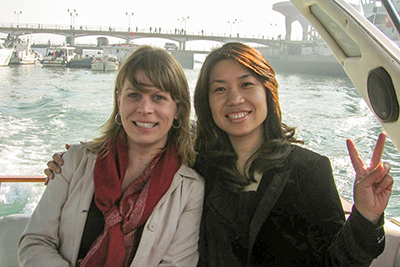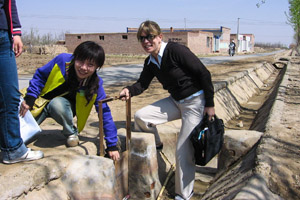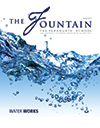
Using Data to Predict the Future of Water Worldwide

Christine Boyle (left) in the Port of Qingdao.
Christine Boyle received her Ph.D. from the University of North Carolina at Chapel Hill in 2011. Before she graduated, she founded her company Blue Horizon Insight to address water issues in the United States and abroad. (In fact, she was preparing for a trip to the Maldives to examine water stability issues when she recently answered a few questions for The Fountain's Assistant Editor Laura Lacy.)
- Tell me about Blue Horizon Insight.
- Blue Horizon Insight is a water resources research and analytics firm that aims to bring more clarity and understanding to a really complicated topic—water. Water has a biophysical element, many social elements and institutional elements, because the government controls water in many places. I created Blue Horizon Insight to fill that void and help communities, cities, companies and people make better use of water.
- You've worked with entities both in the United States and internationally. What specific issues are you helping these various clients address?
- One big issue right now is climate change—and we talk about climate change differently depending on the audience. At the local level, utilities are seeing more volatility in their water resources due to changing weather. Meanwhile, customers' water use is also changing as people and companies become more efficient. All of this impacts water resources. Utility companies are very interested in understanding more about what's coming down the line in the next five to 10 years because they can't use the past to predict the future. They need a new framework to understand what's going on, what to plan for.
- Internationally, I'm advising the World Bank and the government of China on the impact of water resources and how that's going to affect their food security future. Their crops affect both food resources and the global commodity market. When they have a drought and their wheat production goes down, it actually affects people in our own country, like farmers in Kansas and Nebraska. It's all very interconnected. From your neighborhood all the way up to a huge country, water resources have a major impact.
- How do you advise your clients?
- It's all data-driven in order to simulate what the future of water resources might look like. For the local utilities, we use customer billing data. For China, we use a number of different data sources to simulate the impact of climate change on future water resources—runoff, precipitation and the corresponding changes.
- My clients will say they read in the news that water's the new gold or water's the new oil. It's on the minds of so many people, but it's hard to gain a deep understanding of the big picture. And the big picture is that there is no big picture. Water is different in every location. Water is different in every community, every country, every household, so the big picture is the small picture. That's what I help companies do. We maximize empirical, data-driven evidence so that companies and governments have a better understanding of their water-related risks.
- You founded Blue Horizon Insight during your time at Chapel Hill. Tell me about the foundation of the company and what inspired you.
- The inspiration for the company came when I lived in China in 2008 and 2009 as a Fulbright Scholar and started getting some big consulting jobs. One of those jobs was for the city of Qingdao. Another was for a water pollution maps organization in China. I also got a job with a Hong Kong-based brokerage firm. I loved helping solve problems, not in an academic way, but a real pragmatic way. I have a pretty bizarre skill set. I'm a water resource specialist and an entrepreneur, and I'm fluent in Chinese. It became clear that I would make my best contribution outside of academia. I finished my dissertation and did a postdoc for a year at the UNC-Chapel Hill School of Government, with the Environmental Finance Center. When that ended, I started running Blue Horizon Insight full-time. Simply said, I wanted to make a contribution to the world that made the most of my skills, and I saw this gap in the water resources consulting and analytics world. I thought the scholar entrepreneur route was the best fit.
- What do you hope for the future of Blue Horizon Insight?
- I'd like Blue Horizon Insight to have product lines that we can sell to water utilities and companies. I want the company to become the go-to resource for semi-annual and quarterly reports about the water risks and opportunities these companies and governments face. My vision for Blue Horizon Insight is to expand from a consulting business into a data-driven, information hub.

Christine Boyle (right) works with an irrigation research team in Ningxia, China.
♦ Laura Lacy


